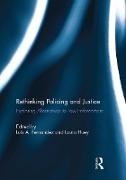Read more
Rethinking Policing and Justice critically examines the role of policing (both state and non-state forms) in the provision of justice (and injustice). It also shows a variety of theoretical, methodology, and other approaches for the critical evaluation of law enforcement, highlighing different insights into alternative modes o
List of contents
Introduction: alternatives to policing Laura Huey and Luis A. Fernandez 1. Responding to officers’ gendered experiences through community policing and improving police accountability to citizens Marilyn Corsianos 2. Policing ‘below the state’ in Germany: neocommunitarian soberness and punitive paternalism Volker Eick 3. The space between the steps: reckoning in an era of reconciliation Michelle Stewart 4. The Shanti Sena ‘peace center’ and the non-policing of an anarchist temporary autonomous zone: Rainbow Family peacekeeping strategies Michael I. Niman 5. Civilian oversight as a public good: democratic policing, civilian oversight, and the social Danielle Hryniewicz 6. "Where Abolition Meets Action: women organizing against gender violence Vikki Law 7. Corking as community policing Jeff Ferrell
About the author
Luis A. Fernandez is Associate Professor of Criminology and Criminal Justice at Northern Arizona University, USA. He is the author of several books, including Policing Dissent: Social Control and the Anti-Globalization Movement and Shutting Down the Streets: Political Violence and Social Control in the Global Era.
Laura Huey is Assistant Professor of Sociology at the University of Western Ontario, Canada. Laura is the author of several publications in the fields of policing, victimization and surveillance, including Negotiating Demands: The Politics of Policing of Skid Row in Edinburgh, San Francisco and Vancouver.
Summary
Rethinking Policing and Justice critically examines the role of policing (both state and non-state forms) in the provision of justice (and injustice). It also shows a variety of theoretical, methodology, and other approaches for the critical evaluation of law enforcement, highlighing different insights into alternative modes o

